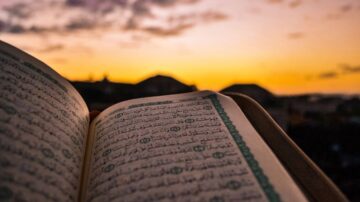Know, may Allah have mercy upon you, that it is obligatory upon you to have knowledge of the four matters:
(i) Knowledge (al – ‘ilm), which is knowledge and awareness of Allah, and knowledge of His Prophet, and knowledge of the deen of Islam with the proofs.
(ii) Action upon that.
(iii) Calling to that.
(iv) Patiently persevering and bearing any harm encountered upon that way.
The proof is the saying of Allah, the Most High: “By time, mankind is in loss, except for those who truly believe and worship Allah alone, and do righteous deeds, performing that which is obligatory upon them and avoiding that which they are forbidden and enjoin one another with patient perseverance upon obedience to Allah and in facing harm and trials.” [Soorat Al ‘Asr]
Ash Shaafi’ee, may Allah have mercy upon him, said: “If Allah had sent down to His creation no other proof besides this Soorat, it would have been sufficient for them.”
Al Bukhaaree, may Allah have mercy upon him, said: “Chapter: Knowledge precedes speech and action’ and the proof is the saying of Allah, the Most High, “Know that none has the right to be worshipped except Allah, and ask forgiveness of your Lord for your sins.” [Soorat Muhammad: 19].
So He began by mentioning knowledge before speech or action.’ Know, may Allah have mercy upon you, that it is obligatory upon every Muslim, male and female, to learn and act upon the following three matters:
THE FIRST: That Allah created us and provided sustenance for us, and He did not leave us without a purpose rather He sent Messengers to us. So whoever obeys him will enter Paradise, and whoever rejects and disobeys him will enter the Fire, and the proof is the Saying of the Most High: “We sent a Messenger to you, o people, as a witness in favor of you or against you on the Day of Resurrection, just as We sent a Messenger to the Pharaoh. But the Pharaoh denied and rejected the Messenger, so We seized him with a severe punishment.” [Soorat al Muzzammil: 16]
THE SECOND: Allah is not pleased that anyone should be made a sharer in worship along with Him, neither any angel brought near, nor any prophet sent as a messenger, and the proof is the Saying of Allah, the Most High, “And the places of worship are for Allah alone, so do not invoke anyone along with Allah.” [Soorat al Jinn: 18]
THE THIRD: That whoever is obedient to the Messenger and singles out Allah with all worship, upon Tawheed, then it is not permissible for him to have friendship and alliance with those who oppose Allah and His Messenger, even if they are those most closely related to him, and the proof is the Saying of Allah, the Most High: “You will not find a people who believe in Allah and the Last Day loving those who oppose Allah and His Messenger, even if they are their fathers, or their sons, or their brothers, or their kinsfolk. Rather Allah has decreed true Belief for their hearts, and strengthened them with proof, light and guidance from Him; and He will enter them into the gardens of Paradise beneath whose trees rivers will flow, and they will dwell therein forever. Allah is pleased with them and they with Him. They are the party of Allah. Indeed the party of Allah are the successful.” [Soorat al Mujaadilah: 22]
Know, may Allah direct you to obedience to Him, that the true and straight Deen, the way of Ibrahim is that you worship Allah alone making the Deen purely and sincerely for Him. This is what Allah commanded all of the people with, and it was for this that He created them. Allah, the Most High, says: “I did not create jinn and mankind except that they should worship Me.” [Soorat adh Dhaariyaat: 56] and the meaning of worship, ‘ibaadah, here is to single Allah out with all worship, Tawheed. And the greatest of all that Allah has commanded is Tawheed which is to single out Allah with all worship. The most serious thing that He forbade is shirk, which is to invoke others besides Him, along with Him. The proof is His Saying, the Most High: “Worship Allah alone, making all worship purely for Him, and do not associate anything in worship along with Him.” [Soorat an Nisaa: 36]

